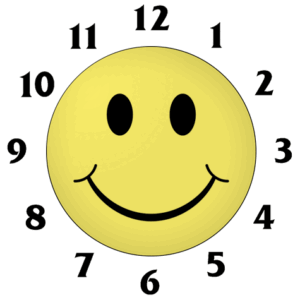“Merely thinking about time pushes us to spend our time in more personally fulfilling ways.” – Cassie Holmes
I am fascinated by the science of happiness and delighted that it has become a topic of inquiry. It tickles me that there are evidence-based strategies for increasing happiness, and I try to incorporate them into my daily life. And why not? Happiness makes us healthier, kinder, more confident people.
 I just finished reading Dr. Cassie Holmes’ book Happier Hour: How to Beat Distraction, Expand Your Time, and Focus on What Matters Most. She arrived at her research focus honestly. She was a working mom who chronically experienced time poverty – i.e., feeling like there just weren’t enough hours in the day. Tempted to chuck her demanding job, she did some preliminary research. It turns out that the least happy people are those with too little discretionary time (<2 hours/day) and those with too much of it (5+ hours/day)! She opted to become a skilled “time investor” by challenging herself to find purpose in her expenditures and a solid happiness return on investment.
I just finished reading Dr. Cassie Holmes’ book Happier Hour: How to Beat Distraction, Expand Your Time, and Focus on What Matters Most. She arrived at her research focus honestly. She was a working mom who chronically experienced time poverty – i.e., feeling like there just weren’t enough hours in the day. Tempted to chuck her demanding job, she did some preliminary research. It turns out that the least happy people are those with too little discretionary time (<2 hours/day) and those with too much of it (5+ hours/day)! She opted to become a skilled “time investor” by challenging herself to find purpose in her expenditures and a solid happiness return on investment.
An obvious starting point was limiting the list of things to be accomplished in any given day. For each of us, that effort must be informed by how we’re actually spending our time and rating the extent to which those activities contribute to our happiness. Based on a survey of 900 working women, Daniel Kahneman reports that people are happiest when connecting socially and least happy when commuting, working, and doing chores. No real surprise there. But let’s go deeper.
Humans are social animals. We depend upon others for our physical, mental, and emotional well-being. Surgeon General Vivek Murthy tells us that loneliness is detrimental to our health. The happiest people cultivate close friends, strong family ties, and romantic attachments. They invest in relationship, feel known by their associates, and engage in reciprocal sharing. We need to make time in our lives for connecting with others. It’s not a luxury to be indulged when everything else gets done; it’s mission-critical for health and happiness.
Research tells us that happiness and meaning are intertwined. Fun activities are experienced as meaningful, and meaningful efforts make us happy. We’re willing to take on activities that aren’t joyful if we can tie them to a broader purpose and/or long-term goal. However, excess alone time, “have to” tasks, and time-wasters make us unhappy. The latter includes screen time (TV, social media, internet surfing) which we think makes us happy but actually doesn’t.
With work consuming a healthy chunk of most folks’ days, it’s crucial to identify a higher order purpose for those efforts. Simply making money won’t stimulate motivation or engagement. Ask: Why do I do the work I do? Why does doing that matter to me? How does it reveal what I care about deeply? The answers to those questions cast work in a different light and make it feel more fulfilling and fun. It also informs how time gets spent at work – e.g., when to say YES and when to say NO. Social connection should layer on top of work; the happiest people have authentic personal engagement at work.
Of course, there are a lot of involuntary daily activities that are part and parcel of living in this world. Cassie has some concrete suggestions to make them less unpleasant:
- Outsource tasks and reclaim some of your precious time. If you don’t like housework, shopping, cooking, gardening, or the like, there are competent professionals and services to tackle those activities for you. Meaningful use of that saved time will matter a lot more than things you otherwise might have purchased with the money.
- Bundle less pleasant tasks with something you enjoy. Listen to podcasts or audiobooks when commuting or doing housework (if you haven’t hired it out). Indulge in your favorite streamed TV show when doing meal preparation. Talk to a friend or family member hands-free when commuting or running errands.
- Schedule your daily chores in a single time slot and just get them over with. That approach reduces the start-stop times and the mental overhead of dreading doing them. Reward yourself with something positive immediately thereafter.
Learn to savor life’s little joys. Through hedonic adaptation, we have a tendency to stop noticing good things that happen repeatedly. Recognize that all these wonderful moments are finite; treasure every one of them. Create rituals that transform the ordinary into something special. Take breathers between pleasurable experiences (e.g., eating ice cream) to recapture the joy of the first encounter and/or add variety to an otherwise repetitive activity.
Train your mind to be present in the moment and relish each experience. Give your self a true break on weekends from all the hustle, bustle, and interrupt. Let yourself “be” rather than constantly “do.” Practice meditation to elevate your sense of presence and your capacity to ignore distraction. Shut the door and give yourself physical space to concentrate when needed. Put your phone away!
Let some of your time go unscheduled and hold fast to those moments. Give yourself the space to think, reflect, write, or simply breathe in the fresh air outdoors.